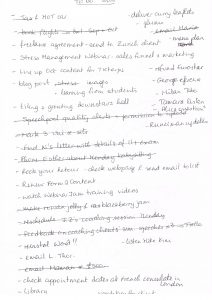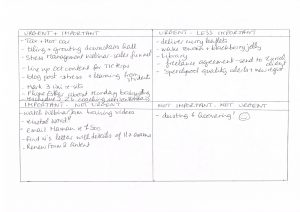Back to school, back to stress
Here in Europe, the summer holidays are drawing to a close.
How are you feeling? Do you find the rentrée, as it’s known in French, exciting or overwhelming?
In some ways, I quite like that ‘going back to school’ feeling; as a creature of habit, I enjoy getting back into a routine, and getting stuck into new projects. I also like the excitement of a new academic year at University, with new students full of optimism.
On the other hand, a very full schedule can feel oppressive and overwhelming, and I find myself dragging my feet when trying to get back into professional mode. I like to keep that holiday feeling going a little longer, so as to avoid the sense of stress and anticlimax that accompanies a return to grey skies, cooler temperatures, and humdrum domestic hassles (leaky roofs, cars with batteries gone flat). There are many ways to do this; at the moment my favourites are:
- eating as if I were still on holiday, with lots of delicious salads.
- getting up later than usual – I’ll put off my normal 5.45 wake-up call for as long as possible!
- reading a lot (admittedly, this is sometimes a way of procrastinating, instead of facing up to boring chores).
However, with the best will in the world, I can’t entirely ignore my massive to-do list, which makes September look like an exercise in squaring the circle. I often wish the day had 27 hours or so, so I could have a fighting chance of getting everything done.
Here are my top 3 tips for dispelling that horrible feeling of drowning in all the things you have to do.
Prioritise your to-do list
I find lists invaluable for keeping track of all my tasks. But sometimes they outgrow the sheet of paper I’m writing them on, and they look so long.

Here’s a simple way to use to-do lists more efficiently.
Divide your sheet into 4 boxes: urgent + important, urgent + less important, not urgent but important, not urgent + not very important.
Fill in the boxes with all the things you need to get done.

Now you can see at a glance the ones you actually need to do right away: they are in the urgent + important box. After that, you can move on to urgent but not important, then to not urgent but important, and finally to not urgent + not very important.
Hopefully, if you try this method, you will see that not everything needs doing today. You can plan the order in which to tackle your tasks, and they feel less overwhelming. And perhaps you (or I) will feel less like this.

Another advantage of this method, as I see it, is that unless I have guests coming to stay, it almost invariably relegates housework to the bottom of the list.

On the other hand, the result is that my tidier other half (better half?) is constantly irritated at the mess in the house. I just tell him we have different priorities. 😉
Get outside for a few minutes and practise mindfulness
A good way to escape that crushing sense that you have more tasks to do than will fit into 24 hours is to get outdoors, even for a few minutes. Breathe some fresh air and practise mindfulness, which means nothing more than being in the present and using your senses: listen to what’s around you (can you hear birdsong?), look around and find something beautiful to appreciate. If you can see plants around you, go and rub a leaf or smell a flower: how does it feel? Does it smell good?

If, like me, you spend a lot of time studying, reading, researching, using computers, and being indoors, you can end up spending 99% of time in your head, and almost forgetting that you have a body. Ground yourself and use all your senses to remind yourself that you are made up of body, mind and spirit. Exercise is very good for this as well.

Here is my daughter, aged 7 months at the time, practising mindfulness, i.e. smelling the roses. I was instilling relaxation principles in her at a young age. 😉
Alas, five minutes later, I discovered she wasn’t actually sniffing the rose petals, but chewing on them. This had unfortunate results on her digestive system, which caused some stress. Never mind…
Readjust your mindset
Take five minutes to reset your mindset.
When I was talking to my husband about how he manages his (extremely stressful) job, he suggested reminding yourself that you can only do your best, so there’s no point fretting if you can’t be perfect.
The problem I see with this is that perfectionist types tend to think that ‘doing their best’ means ‘doing everything perfectly’ and aren’t always able to accept what they view as lowering their standards.
Instead, if you want a quick re-boot of your attitude, I would suggest one of the following tricks:
- Imagine that what you are going through is being described by a friend: the pressure he/she is under, all the stuff he/she needs to do in a ridiculously short time, his/her feelings of inadequacy, etc. What advice would you give your friend? We are generally far more understanding, sympathetic and helpful to other people than we are to ourselves. If you can take a step back and pretend someone important to you is faced with this situation, you are likely to give them (i.e. yourself!) more realistic and objective advice.
- Ask yourself: what’s the worse that could happen? What’s the worst case scenario if you don’t complete your to-do list? Your life won’t apart. Likely, there are only two or three items on there that could have serious consequences on your life or career: do those first, and ignore the rest for now, if you don’t have time for them (or if getting enough sleep/food/exercise/fun is more important to your physical and mental wellbeing).
I hope this has given you some ideas for quick fixes when you’re feeling overwhelmed and you’ve got post-holiday blues.
Perhaps your stress is on a different scale altogether: you’ve got a huge work assignment or interpreting exams coming up, or you’re finding your interpreting course very demanding.
If you’re after more tips and some hard-core stress management advice, I will be holding a 60 minute webinar entitled ‘Stress Management for Interpreters on Thursday, 6th September, followed by a Q&A (cost: €40). I know all about work stress from my own experience as a conference interpreter, but I also have a background in fitness training and complementary therapies, so I like to bring that insight about wellbeing and relaxation into the webinar (I’ll spare you a photo of me in a Lycra leotard, though).
You can register here:
https://events.genndi.com/reg…/818182175026322002/0ac73e8e6f
or on the home page of www.theinterpretingcoach.com (just scroll down to find the webinar details).
Hope to see you there!
In the meantime, why not leave a comment below. Did my tips help? What do you do to reduce that feeling of overwhelm?
 Sophie Llewellyn Smith, writing as The Interpreting Coach, is a coach, interpreter trainer, conference interpreter, designer of online teaching materials, and creator of Speechpool. Follow the blog to pick up tips on how to improve your interpreting skills, and check out the website for digital material to complement your face-to-face learning and empower you to take control of your learning. If you’re interested in personal coaching, why not book a free discovery call?
Sophie Llewellyn Smith, writing as The Interpreting Coach, is a coach, interpreter trainer, conference interpreter, designer of online teaching materials, and creator of Speechpool. Follow the blog to pick up tips on how to improve your interpreting skills, and check out the website for digital material to complement your face-to-face learning and empower you to take control of your learning. If you’re interested in personal coaching, why not book a free discovery call?


Hi Sophie,
I particularly like the 4-way split of the “to-do” list – I’ll give it a go.
Good luck with the 2018-19 kick-off!
Thanks, Heather! Good luck with your ‘rentrée’!